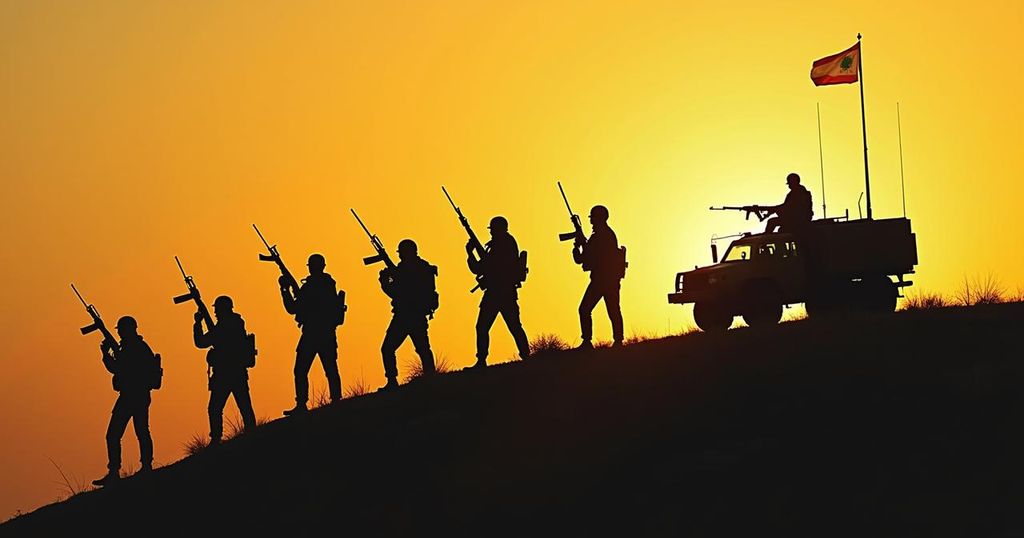Hezbollah denies Israeli ground troop incursions into southern Lebanon while claiming rocket attacks on Israeli military sites. Prime Minister Mikati calls the situation one of Lebanon’s gravest crises, urging humanitarian aid for affected civilians. Swiss Air and Lufthansa suspend flights over safety concerns, and France positions a naval carrier for potential evacuations. The humanitarian crisis worsens with widespread displacement and ongoing violence in the West Bank, as local leaders appeal for urgent international support.
Hezbollah has denied that Israeli ground forces have entered southern Lebanon amid escalating tensions in the region. Lebanese Prime Minister Najib Mikati stated that the nation is undergoing “one of the most dangerous phases of its history.” In a striking response, Hezbollah reported launching a series of “Fadi-4” rockets targeting the Glilot base in Tel Aviv, which is the operational hub for the Israeli military Intelligence Unit 8200. They also claimed responsibility for an attack on the Mossad headquarters in the suburbs of Tel Aviv. While the Israeli military confirmed some of these rocket attacks, they asserted that defences intercepted several launches. Amid these developments, Swiss Air announced a suspension of its flights to Beirut and Tel Aviv, extending through November 30 and October 31, respectively, to ensure predictability for passengers and crews. Moreover, Prime Minister Mikati and UN humanitarian coordinator Imran Riza initiated an urgent appeal for over $400 million to address the humanitarian needs of civilians affected by the ongoing conflict. OCHA indicated that this flash appeal aims to mobilize immediate resources for those impacted by the crisis in Lebanon. In anticipation of potential evacuations, a French helicopter carrier is set to arrive in the Eastern Mediterranean soon, as Western nations assess options for safely extracting their citizens from Lebanon amidst fears of a full-scale war. France, which has around 20,000 nationals in Lebanon, has dispatched the Dixmude helicopter carrier from Toulon to offer support. The Israeli military reiterated that its operations in southern Lebanon are aimed at Hezbollah positions perceived as threats, and insisted this does not constitute a war against the Lebanese populace. The military spokesperson emphasized targeting Hezbollah strongholds infiltrating civilian areas, stating, “Hezbollah turned Lebanese villages next to Israeli villages into military bases ready for an attack on Israel.” In other developments, recent updates from the Palestinian Health Ministry reported fatalities and injuries resulting from Israeli military actions in the West Bank, highlighting ongoing violence in the region. There were incidents recorded, including the death of Abdul Hakim Mamoun Abdul Hamid Shaheen in Nablus, alongside other wounded individuals at the hands of Israeli troops. The Palestine Red Crescent Society indicated that their emergency medical technicians had come under fire while attempting to assist injured civilians, stressing the ongoing humanitarian crisis in these contested territories. Prime Minister Mikati called attention to the displacement crisis in Lebanon, noting that around one million people have been uprooted due to the ongoing Israeli military actions. He urged the United Nations for enhanced support, declaring, “We urgently call for more aid to reinforce our ongoing efforts to provide basic support to displaced civilians.”
The conflict between Israel and Hezbollah has escalated significantly, leading to military actions, rocket fire, and humanitarian appeals. In the context of ongoing violence in the region, both parties have exchanged attacks, with Hezbollah claiming launches at strategic military locations in Israel, and Israel asserting targeted operations against Hezbollah. The humanitarian situation in Lebanon has deteriorated due to air strikes and ground incursions, resulting in mass displacements and a critical need for international aid. The involvement of global airlines in suspending flights reflects the heightened tensions and risks in the region, contributing to concerns among foreign nationals about their safety.
The current situation between Israel and Hezbollah poses significant dangers, not only for the military and political landscape of the region but also for the civilian population caught in the conflict. The responses from both parties highlight the severity of the ongoing hostilities and the pressing humanitarian needs that arise from such escalation. The coordinated efforts by Lebanese authorities and international entities for humanitarian aid emphasize the urgent requirement for assistance as the conflict adversely affects a large number of civilians, compounded by the imminent threat of displacement.
Original Source: www.aljazeera.com







